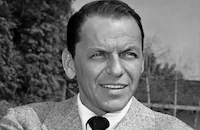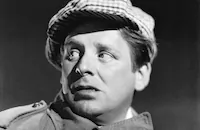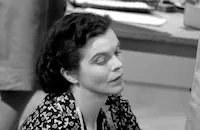Johnny Concho
Brief Synopsis
Cast & Crew
Don Mcguire
Frank Sinatra
Keenan Wynn
William Conrad
Phyllis Kirk
Wallace Ford
Film Details
Technical Specs

Synopsis
In the 1870s, Johnny Concho, the younger brother of notorious gunman Red Concho, has become boss of Cripple Creek, Arizona. Although Red is not a resident, the townspeople allow themselves to be bullied and robbed by the cowardly Johnny. Mary Dark, daughter of the general store owner, loves Johnny despite his arrogance and dependence on his brother's reputation, while the town's sheriff tells Johnny that one day, when Red is no longer around, things will be very different. One evening, during an obligatory poker game to which prominent citizens like Judge Tyler, Helgeson the blacksmith, and various ranchers are "invited," a bemused stagecoach passenger watches as Johnny is allowed to win without ever revealing his hand. Cowboys Tallman and Walker then enter the saloon and Tallman asks to sit in on the game, although everyone discourages his participation. When Johnny wins again without showing his cards, Tallman challenges him. Johnny asks the others to explain to Tallman who he is but Tallman is unimpressed and reveals that he killed Red two days earlier in a gunfight. Sheriff Henderson has been summoned and Johnny begs for his help. After Tallman gives Johnny the option of drawing his gun or leaving town by sundown the next day, Johnny tries to get support from the townspeople he has victimized. No one will help him, although Judge Tyler offers to assist him in preparing his will. Meanwhile, Tallman takes over Johnny's room in the saloon and makes it clear that he is the town's new boss. Henderson tells Johnny that he wears a special holster that springs open, enabling him to beat many gunmen to the draw, and while doubting that Johnny will have the guts to use the holster, gives it to him. Later, Tallman appoints himself sheriff and, promising "protection" for the town, demands twenty cents of every dollar coming into it. When Johnny confronts Tallman, Tallman shoots the holster from his belt and Johnny rides off despite Mary's pleas. Subsequently, Johnny is driven out of several towns as the sheriffs sense he will bring trouble. One night Mary, who has been following him, rides into his camp, and although Johnny tells her that he is broke, has no food or money and has the "sign of a leper" upon him, she offers to stay with him. Mary has brought three hundred dollars with her and wants them to head for California to begin a new life. They decide to get married and, in a nearby town, discover preacher Barney Clark, a reformed gunman. However, two gunmen, Mason and Lem, learn that they are in the church, and as Red had killed Mason's partner, decide to wait for Johnny. After Johnny finally realizes that he is a total coward, Mary begins to doubt their relationship. When Mason and Lem enter his church, Barney reveals that he is wearing a gun and tells them to leave. Barney then tries to proceed with the marriage ceremony, but Mary can no longer bear Johnny's cowardice and refuses to marry him. After advising Johnny to go home and be honest, Barney reveals that he knew Red and that he was a coward, a sneak and a murderer. Enraged, Johnny threatens to kill Barney, who offers him his gun for the act. The confrontation gives Johnny the courage he so desperately needs, and he and Barney leave the church together. When they encounter Mason and Lem, Barney points a shotgun at them, allowing Johnny to ride off. Meanwhile, in Cripple Creek, Tallman has reinforced his position and when only rancher Sam Green will stand up against him, Tallman shoots him in the back. After Johnny follows Mary back to Cripple Creek, he meets Tallman in front of the saloon and tells the townspeople that Tallman is no different than Red was--a thief and a murderer--and urges them to fight and destroy Tallman. Although Johnny is not wearing a gun, Tallman shoots him, wounding him in the shoulder, but Johnny's act of courage provokes Mary's father to shoot Tallman while the saloon's owner shoots Walker. The judge and the sheriff then empty their guns into the two killers. Johnny thanks the townspeople and prepares to leave, but the sheriff says they would like him to stay. As he has also redeemed himself in Mary's eyes, Johnny happily agrees.

Director

Don Mcguire
Cast

Frank Sinatra

Keenan Wynn

William Conrad

Phyllis Kirk

Wallace Ford

Dorothy Adams
Christopher Dark
Howard Petrie
Harry Bartell
Dan Riss

Willis Bouchey
Robert Osterloh
Jean Byron
Leo Gordon

Claude Akins

John Qualen
Wilfrid Knapp
Ben Wright
Joe Bassett
Crew
Gustav Bernsten
Leon Birnbaum
Robert Carlisle
Stanley Detlie
Emmett Emerson
David P. Harmon
David P. Harmon
Don Mcguire
William Mellor
Arthur Morton
Ernest J. Park
Lindsley Parsons Jr.
Bernard Ponedel
Nicolai Remisoff
Nelson Riddle
Robert Roderick
Henry Sanicola
Frank Sinatra
Lynn Stalmaster
Dean Thomas
Jimmie Vaughn
Opal Vils
Gwen Wakeling
Eda Warren
Henry West
Patricia Westmore

Film Details
Technical Specs

Quotes
Trivia
Notes
Johnny Concho marked Frank Sinatra's first film as a producer, the first and only film made by his own company, Kent Productions, Inc., and his first Western. The film's pressbook reports that, one week prior to production, Phyllis Kirk replaced Gloria Vanderbilt in the role of "Mary Dark." Although a December 6, 1955 Hollywood Reporter news item includes Juney Ellis in the cast, her appearance in the completed film has not been confirmed. In June 1960, Daily Variety reported that Jack Broder's Realart Productions had sold the rights to David P. Harmon's original story to Sinatra's company and was suing to obtain a share of the profits. Broder alleged that he was owed between $20,000 to $60,000 for the film, which had been theatrically re-released in 1960. The disposition of the suit has not been determined.

Miscellaneous Notes
Released in United States Summer July 1956
Released in United States Summer July 1956











